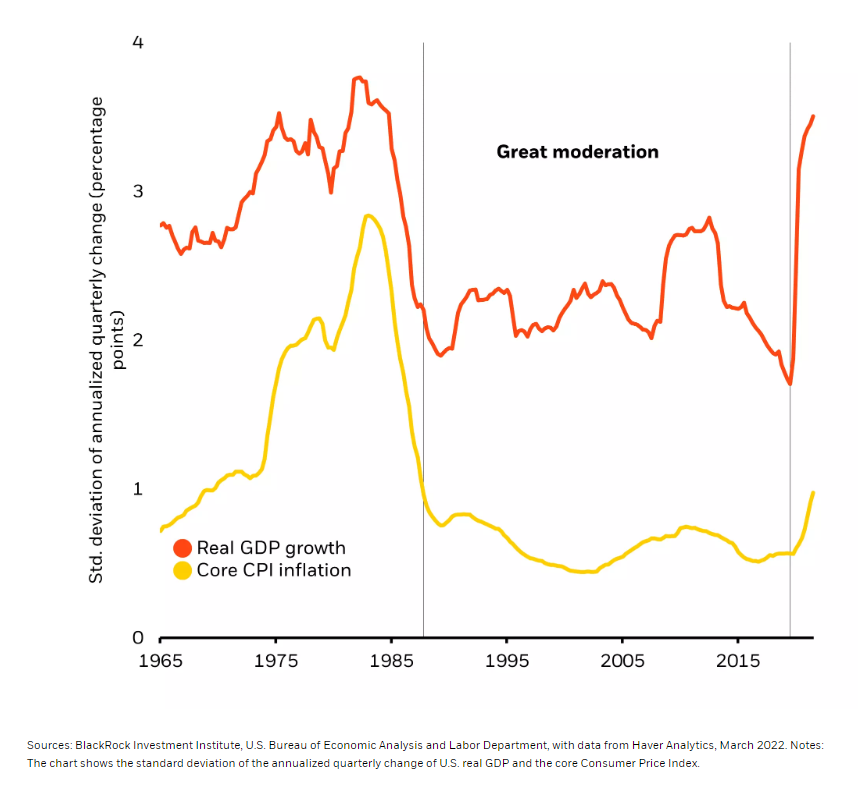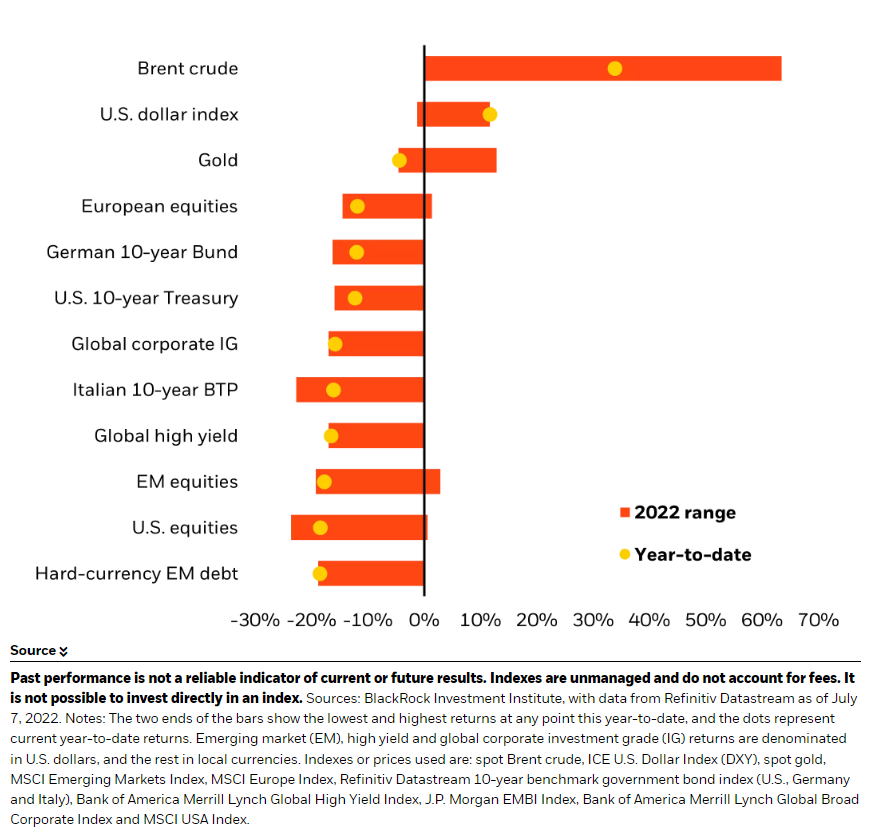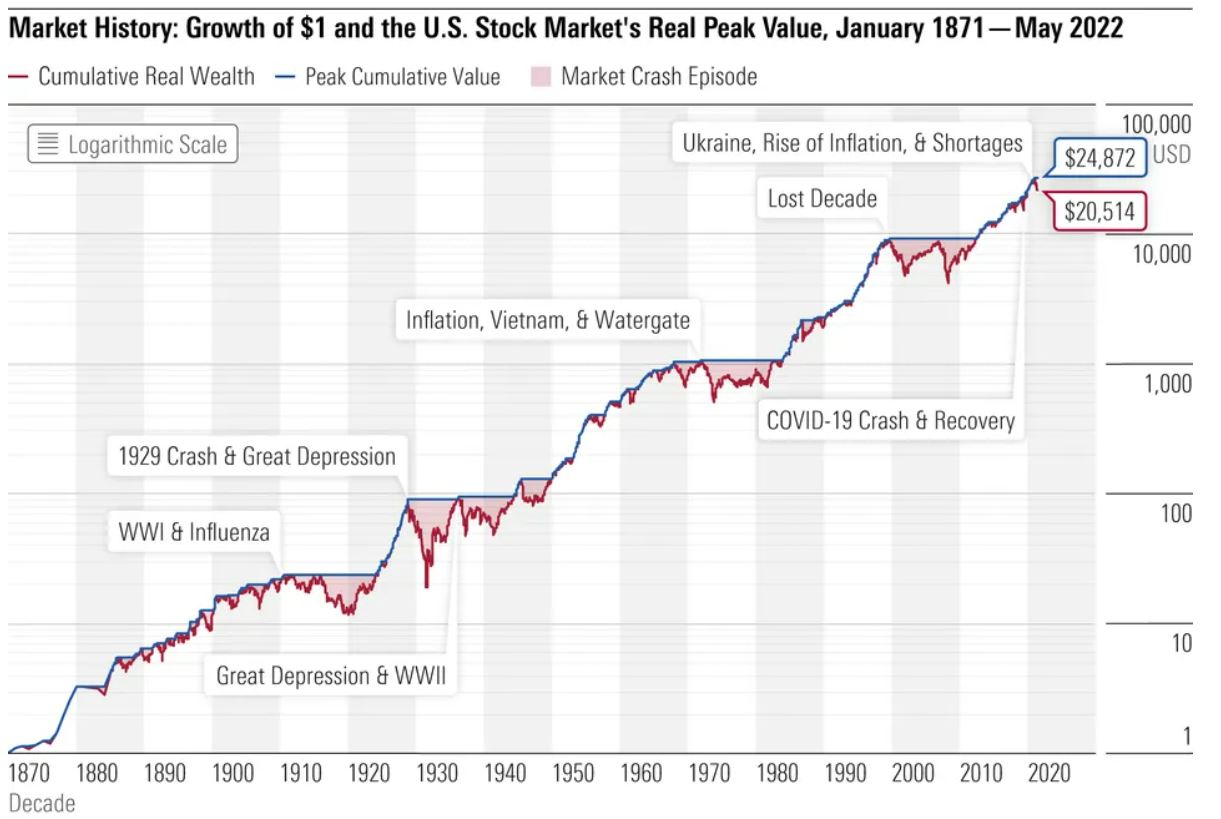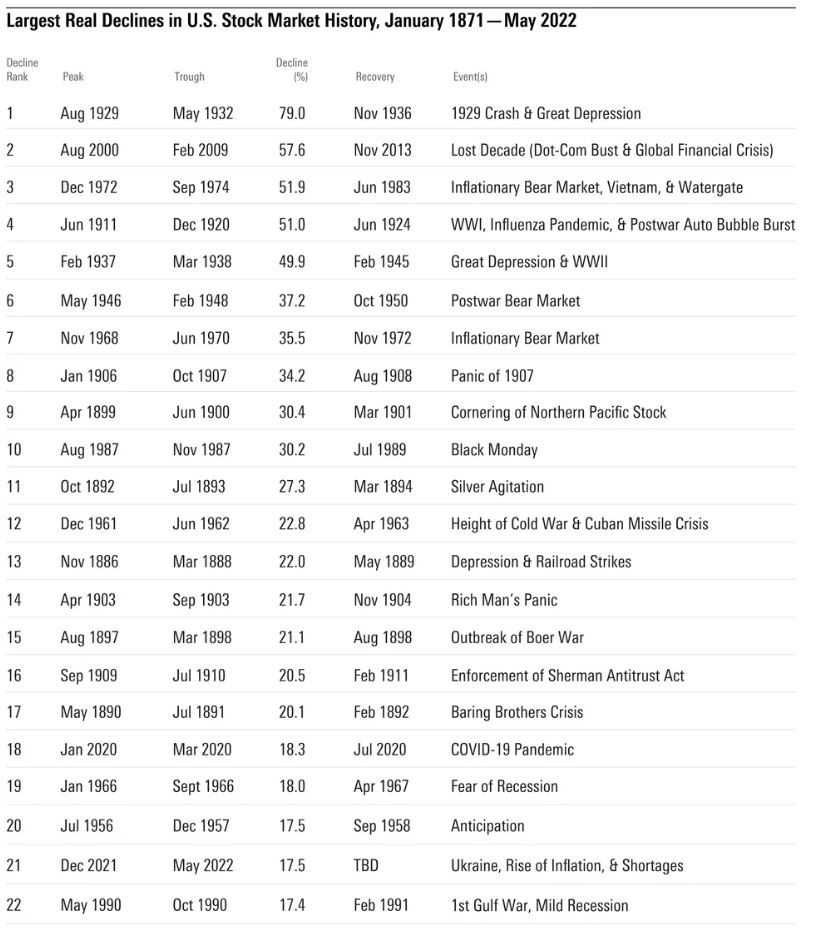Franklin Templeton’s Notes from the Trading Desk offers a weekly overview of what our professional traders and analysts are watching in the markets. The European desk is manned by eight professionals based in Edinburgh, Scotland, with an average of 15 years of experience whose job it is to monitor the markets around the world. Their views are theirs alone and are not intended to be construed as investment advice.
The Digest
Global equities closed higher last week ahead of what is expected to be a relatively uncertain earnings season. The S&P 500 Index closed the week up 1.9%, the Europe Stoxx 600 Index closed up 2.5% and the MSCI Asia Pacific Index closed up 1.4%. Despite the moves higher, market sentiment remained very bearish and there was a lack of positive catalysts. The key driver it seems was short covering; hedge funds appeared to close out some risk ahead of earnings season, as most-shorted baskets all outperformed. Hawkish US Federal Open Market Committee (FOMC) minutes, gas shortages in continental Europe, rising COVID-19 cases in China, and political turmoil in the United Kingdom all gave investors reasons for pause. Growth and recession concerns remain, so whilst the market may be prone to these bear market squeezes, investors are just as concerned about what could make the bear market even worse.
Russian gas imports into Europe on a knife edge
The situation around gas imports from Russia continues to worry investors in Europe. Russian gas exports to Europe have already fallen by approximately 75% in June 2022 vs June 2019 (the last “normal year”). Usually, imports from Norway and United States (liquified natural gas) would compensate for lower imports from Russia; however, the sheer volume of the drop in flows via Nord Stream 1 (NS1) has been difficult to replace. Last Monday, we mentioned reports of impending strike action by gas workers in Norway. These strikes were avoided after the Norwegian government stepped in to settle the labour dispute. However, if the strikes had gone ahead, this could have resulted in a reduction by 60% of Norway’s gas supplies, which highlights once again the precarious position the European economy is in.
On a more positive note, a headline suggesting a NS1 turbine would be returned from Canada to Russia buoyed markets on Friday. A Russian government statement said that this would allow for raising gas flows following the scheduled maintenance shutdown, which starts today. The real fear here is that the gas flow does not resume at the end of the scheduled maintenance period, on 21 July. If the maintenance period is prolonged, or if Russia decrease gas flows, then we would expect European governments to take stricter action to protect gas storage levels through winter and into 2023.
In the long term, attention for investors is still on how European governments deal with their reliance on Russian gas, especially Germany. The focus continues to intensify. Last week, Germany recorded its first trade deficit since reunification. As gas prices continue to surge and the German government prepares a tool to pass those costs on to consumers, we are reminded of the near-impossibility of meeting all the various and contradictory objectives. We think this will continue to be a key market theme for the weeks ahead.
Given the situation in Germany, euro weakness was also a key theme last week, with euro/US dollar at levels not seen since late 2002 and within touching distance of parity.
Italy also declared a state of emergency in five regions that have been hit heavily by drought. The economic situation is certainly providing a headwind for the euro, but divergent central bank policies do, too. The US Federal Reserve (Fed) is expected to raise interest rates by 75 basis points (bps) on 27 July, whilst the European Central Bank (ECB) has maintained a much slower trajectory as they need to offset peripheral rate spike concerns (in this context the Italian 10-year yield is key). The market is currently pricing in a 25 bps hike from the ECB in July. With both these factors likely to provide some weight for months to come, it’s unlikely the euro will find any love any time soon.
The end of the road for Boris
It was a rather chaotic week in British politics, with Prime Minister Boris Johnson finally succumbing to pressure from all sides to resign. The latest scandal was over his misguided support of former Deputy Chief Whip Chris Pincher, who quit after allegedly assaulting two men. Other major recent incidents included the loss of two crunch by-elections that triggered the resignation of the party chairman, lingering resentment over coronavirus lockdown-busting parties and a poor showing in the June confidence vote, where 41% of his own members of parliament withdrew their support. Even on Thursday morning, it appeared as though Johnson would doggedly carry on, insisting that he had a “colossal mandate to keep going” despite several of his own cabinet ministers urging him to go, including the Chancellor, Nadhim Zahawi, who was only appointed two days prior.
Ultimately, Johnson resigned, but insisted that he would remain as caretaker prime minister until a new Conservative leader and prime minister is appointed, most likely by September.
The list of contenders for leadership includes the former Chancellor Rishi Sunak, the Trade Minister Penny Mordaunt and Foreign Secretary Liz Truss. Sunak is currently the bookmakers’ favourite; however, his public image was knocked earlier this year when his family’s tax affairs were leaked to the media and revealed overseas earnings were not taxed in the United Kingdom due to his wife’s “non-domicile” status. Whilst not illegal, it was viewed as inappropriate by many and some Tories questioned Sunak’s judgement.
The choice of leader will influence two key decisions:
- First, the direction of fiscal policy. Candidates are likely to differ on their approach on further fiscal support for the cost-of-living crisis, as well as tax cuts (income tax cuts as well as reconsidering the planned rise in corporation tax from 19% to 25% next year). Sunak will focus on fiscal discipline, while Truss has already pledged to start cutting taxes “from day one”.
- Second, the approach towards the European Union (EU) on Northern Ireland. Candidates are likely to differ on their approach towards the EU, with hard-line contenders (Truss) and those who may wish to find a compromise with the EU (Sunak). A more compromising stance towards the EU on Northern Ireland would result in the Northern Ireland Bill being delayed, which would alleviate tensions with the EU.
What we can say for sure is that the leadership race will be a disjointed affair, which will arguably only further weaken a Conservative Party under the cosh in the short term. However, if the process runs relatively smoothly, then the election of a new leader and a more united government would eventually reduce political uncertainty in the medium term.
In terms of markets, the British pound traded up on the news, closing up 0.81% Thursday against the US dollar. Outside of that, it appeared to be a “nothing done” insofar as equity markets were concerned, with the FTSE 250 Index closing the week up 1.5%. This perhaps reflects the bearish sentiment around markets right now and the fact that they had been pricing in Johnson’s resignation.
Week in review
Europe
European equities rallied off a new year-to-date low on Tuesday to finish up 2.5% last week overall. Despite the move, bearish sentiment still continues to grip the market as investors fret about the direction of the global economy and whether it is heading for a recession. The situation regarding Russian gas and Boris Johnson’s resignation garnered the most attention. The Bank of America Bull & Bear Indicator continues to record 0.0, representing “maximum bearish” sentiment. With that, we saw a dearth of real buyers at the start of the week, leading to some sizeable risk-off moves. Recessionary fears led investors to start trimming some of their year-to-date winners, with defense and energy stocks selling off on Tuesday.
European stocks bounced 4% off the lows last week, driven largely by covering. Sector performance divergence was around 6% on the week, with the year-to-date winners being sold and vice versa. The year-to-date underperformer, retail, received a reprieve last week, finishing up amid covering. Utilities struggled as investors reduced their exposure given the very uncertain picture in that space. Overall, growth stocks outperformed value stocks despite the grind higher in the US 10-year Treasury yield.
Cyclicals and most-shorted stocks outperformed. UK banks, EU defense and EU oils lagged. Unfortunately, it was a familiar theme for European equity fund flows, recording their 21st consecutive week of outflows. The upcoming earnings season is garnering more attention, with the quality of the next round of corporate reporting looking increasingly uncertain with earnings estimates expected to be revised lower.
United States
US equity markets rallied into the end of last week to close up 1.9% overall. It was a holiday-shortened week, with all US markets closed on Monday for Independence Day. The Nasdaq Index bounced back well after a disappointing showing the previous week, finishing up 4.7%, as investors sold energy stocks and bought technology. The Nasdaq recorded five straight days of gains, its longest winning streak since November. There were comments last week talking up the strength of the US economy from Fed members James Bullard and Christopher Waller, and Friday’s June employment report backed them up, registering a solid gain of 372,000 in nonfarm payrolls. Average hourly earnings were also higher than expected, up 5.1%.
The minutes from the latest FOMC meeting were also in focus for markets last week. The Fed failed to rule out more restrictive monetary policy. “Inflation” was mentioned 90 times in the release, with the minutes stating that the central bank does not want it to become entrenched. A handful of Fed officials, including Bullard and Waller, two of its most hawkish policy makers, said this week that they supported raising interest rates by 75 bps for a second month in a row, despite the steadying economic picture and the pullback in commodity prices through June. Fed officials face the challenge of trying to engineer a “soft landing” for the US economy.
Asia Pacific
Last week was mixed week in Asia, with China’s equity market down nearly 1%, but the wider MSCI Asia Pacific Index closed up 1.37%.
Japan’s equity market closed the week up 2.24% as optimism that the Fed will be able to cool inflation and keep recession at bay and news of China’s stimulus helped keep markets in the green. This, despite the government’s dovish policies continuing to weigh on the yen. Also, the Bank of Japan set a monthly record in June in its JGB purchases, as it sought to stem the rise in long-term yields above the 0.25% cap it has set under its policy of yield curve control.
However, it was the tragic murder of former Prime Minister Shinzo Abe that dominated the headlines. He was shot whilst campaigning for the ruling Liberal Democratic Party (LDP) in the city of Nara. The gunman has been identified as Tetsuya Yamagami, 41, an unemployed former member of the Japan Maritime Self-Defense Force. After stepping down in 2020, Abe remained influential as a member of parliament and head of the LDP. Current Prime Minister Fumio Kishida’s government largely retained the basic tenets of Abe’s signature economic policy, commonly referred to as “Abenomics”, built on the three pillars of monetary easing, fiscal stimulus and structural reforms.
China’s equity market closed last week down 0.93% as COVID and geopolitical risks continue to dominate the headlines. Shanghai, which recently ended a two-month lockdown, faces a ”relatively high” risk of further community transmission of COVID, a senior health official said on Friday. Elsewhere, Reuters reported that China will set up a state infrastructure investment fund worth CNY500 billion (US$74.69 billion) to spur infrastructure spending and support the economy. Looking ahead, more June economic data will be released this week, including inflation, total social financing and trade data. We will also see more companies reporting first-half earnings.
Hong Kong’s equity market closed down 0.61% as investors weighed whether a flare-up of COVID-19 cases in mainland China will hamper the country’s economic recovery momentum and how effective the latest stimulus of unprecedented bond sales would shore up the economy. Macau casino operators tumbled after government data released last Friday showed the city’s gaming revenue plunged 62% in June to a 21-month low, the fourth consecutive month in which year-over-year revenue has slumped by more than half. Meanwhile, a COVID-19 cluster found linked to 13 cases in SJM’s Grand Lisboa Hotels further dampened sentiment.
Week ahead
Macro week ahead highlights
Political events take centre stage in the week ahead. After Johnson announced his intention to resign as UK prime minister, the ruling Conservative Party must now choose a successor. The timetable for that contest is expected within days. But whoever gets the job will have to grapple with stalling economic growth—a reality that monthly gross domestic product (GDP) data will likely underscore. Meanwhile, a routine maintenance closure of the key Nord Stream 1 gas pipeline scheduled for Monday will highlight the euro area’s vulnerability on energy.
Key events
Tuesday 12 July: Germany ZEW Expectations Survey
Wednesday 13 July: UK Monthly GDP (month over month [M/M]), Euro-area Industrial Production (M/M)
Monday 11 July
- The Nord Stream 1 gas pipeline is due to close for a 10-day maintenance period
- Bank of England (BoE) Governor Andrew Bailey appears before the UK’s Treasury Committee
Tuesday 12 July
- Germany ZEW Survey
- China Trade Balance
- ECB’s Francois Villeroy de Galhau speaks at Europlace International Financial Forum in Paris
- BoE Governor Andrew Bailey discusses the economic landscape at an OMFIF event in London
Wednesday 13 July
- UK Monthly GDP, Industrial Production M/M, Manufacturing Production M/M
- Euro-area Industrial Production
- Germany Consumer Price Index (CPI) M/M
- France CPI Y/Y
- Spain CPI Y/Y
- US MBA Mortgage Applications, CPI M/M
Thursday 14 July
- China Fixed Asset Investment, GDP, Industrial Production, Retail Sales
- ECB’s Mario Centeno speaks at a parliamentary hearing in Lisbon
- US Producer Price Index (PPI) Final Demand M/M, Initial Jobless Claims
Friday 15 July
- Italy CPI EU Harmonised Y/Y
- G20 – Group of 20 finance ministers and central bankers meet in Bali. Through 16 July
- ECB’s Olli Rehn speaks on the economy and inflation at the SuomiAreena 2022 in Pori, Finland
- US Empire Manufacturing, Retail Sales Advance M/M, Industrial Production M/M, University of Michigan Sentiment
Franklin Templeton Key risks & Disclaimers:
What Are the Risks?
All investments involve risks, including the possible loss of principal. The value of investments can go down as well as up, and investors may not get back the full amount invested. Stock prices fluctuate, sometimes rapidly and dramatically, due to factors affecting individual companies, particular industries or sectors, or general market conditions. Bond prices generally move in the opposite direction of interest rates. Thus, as prices of bonds in an investment portfolio adjust to a rise in interest rates, the value of the portfolio may decline. Investments in foreign securities involve special risks including currency fluctuations, economic instability and political developments. Investments in developing markets involve heightened risks related to the same factors, in addition to those associated with their relatively small size and lesser liquidity.
Any companies and/or case studies referenced herein are used solely for illustrative purposes; any investment may or may not be currently held by any portfolio advised by Franklin Templeton. The information provided is not a recommendation or individual investment advice for any particular security, strategy, or investment product and is not an indication of the trading intent of any Franklin Templeton managed portfolio.
Past performance is not an indicator or guarantee of future performance. There is no assurance that any estimate, forecast or projection will be realised.
This article reflects the analysis and opinions of Franklin Templeton’s European Trading Desk as of 11 July 2022, and may vary from the analysis and opinions of other investment teams, platforms, portfolio managers or strategies at Franklin Templeton. Because market and economic conditions are often subject to rapid change, the analysis and opinions provided may change without notice. An assessment of a particular country, market, region, security, investment or strategy is not intended as an investment recommendation, nor does it constitute investment advice. Statements of fact are from sources considered reliable, but no representation or warranty is made as to their completeness or accuracy. This article does not provide a complete analysis of every material fact regarding any country, region, market, industry or security. Nothing in this document may be relied upon as investment advice or an investment recommendation. The companies named herein are used solely for illustrative purposes; any investment may or may not be currently held by any portfolio advised by Franklin Templeton. Data from third-party sources may have been used in the preparation of this material and Franklin Templeton (“FT”) has not independently verified, validated or audited such data. FT accepts no liability whatsoever for any loss arising from use of this information and reliance upon the comments, opinions and analyses in the material is at the sole discretion of the user. Products, services and information may not be available in all jurisdictions and are offered by FT affiliates and/or their distributors as local laws and regulations permit. Please consult your own professional adviser for further information on availability of products and services in your jurisdiction.
Issued by Franklin Templeton Investment Management Limited (FTIML) Registered office: Cannon Place, 78 Cannon Street, London EC4N 6HL. FTIML is authorised and regulated by the Financial Conduct Authority.
MeDirect Disclaimers:
This information has been accurately reproduced, as received from Franklin Templeton Investment Management Limited (FTIML). No information has been omitted which would render the reproduced information inaccurate or misleading. This information is being distributed by MeDirect Bank (Malta) plc to its customers. The information contained in this document is for general information purposes only and is not intended to provide legal or other professional advice nor does it commit MeDirect Bank (Malta) plc to any obligation whatsoever. The information available in this document is not intended to be a suggestion, recommendation or solicitation to buy, hold or sell, any securities and is not guaranteed as to accuracy or completeness.
The financial instruments discussed in the document may not be suitable for all investors and investors must make their own informed decisions and seek their own advice regarding the appropriateness of investing in financial instruments or implementing strategies discussed herein.
If you invest in this product you may lose some or all of the money you invest. The value of your investment may go down as well as up. A commission or sales fee may be charged at the time of the initial purchase for an investment. Any income you get from this investment may go down as well as up. This product may be affected by changes in currency exchange rate movements thereby affecting your investment return therefrom. The performance figures quoted refer to the past and past performance is not a guarantee of future performance or a reliable guide to future performance. Any decision to invest in a mutual fund should always be based upon the details contained in the Prospectus and Key Investor Information Document (KIID), which may be obtained from MeDirect Bank (Malta) plc.






